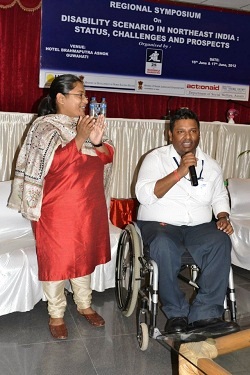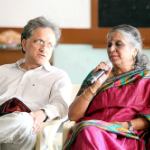For some, perhaps most, Nelson Mandela is an icon of popular culture as much as politics.There are stories here in London of pre-teen girls dancing in the school playground in the 1980s to the marvelous song “Free Nelson Mandela” by The Specials http://www.youtube.com/watch?v=AgcTvoWjZJU just as they might have danced in the same playground with the same friends to Wham! singing “Last Christmas” http://www.youtube.com/watch?v=E8gmARGvPlI. And there are reports of folks today associating Mandela with actors who have portrayed him on film, such as Morgan Freeman (in this case, a public illustration mistakenly used an image of the actor).
The press has made much of this error http://tribune.com.pk/story/647773/actor-morgan-freeman-mistaken-for-mandela-in-indian-billboard-blunder/.
But is it such a mistake? The points of reference for both the song and the banner are not Mandela the freedom fighter, lawyer, politician, communist, prisoner, parent, lover, or man. They are, instead, a Hollywood actor and a British pop group. This is a measure of how he has transcended time and space to become an icon for all. That might sound trivial, but it is a token of how thickly nested he is in popular consciousness.
All people of such stature have their hagiographers and detractors http://www.slate.com/articles/news_and_politics/fighting_words/2003/10/mommie_dearest.html. In the case of Mandela, he was immediately feted in death by many of those who had profited from opposing him. Consider the British Prime Minister, David Cameron, who had lobbied against anti-apartheid sanctions as a not-very-bright young thing. Cameron’s confreres in the Federation of Conservative Students even wore badges that read “Hang Nelson Mandela” http://www.theguardian.com/politics/2013/dec/06/conservative-party-uncomfortable-nelson-mandela.
To his credit, Cameron thought again (though not terribly hard) http://www.theguardian.com/commentisfree/2006/aug/27/conservatives.southafrica. But for some critics on the left, reactions such as Cameron’s were signs of Mandela’s rehabilitation into mainstream economics and politics and a refusal of his radical past.
It is indeed extraordinary that governments which supported apartheid and maligned the African National Congress in the 1980s, and mourned Ronald Reagan and Margaret Thatcher thirty years later—governments that today use drone technology and torture techniques at will—can rally to provide a seemingly universal message of tribute at this loss http://www.cuartopoder.es/tribuna/por-que-todos-hablan-bien-de-mandela/5308.
Or is it? Nelson Mandela is a stranger to almost all of us, yet someone we feign to know, whether we are mass-murdering US imperialists, credulously scribbling UK journalists, or you and me. It is as if hehas beenpart of our daily lives over the last two decades, positioned by capitalism, government, and the media as a key symbol of race, masculinity, and forgiveness. His personal qualities and social impacts have been reincarnated in commerce, art, and fantasy as resources for our everyday lives. Put another way, he is a celebrity.
The idea of celebrity has been around since the first portraits in 12th-century Europe,whichmarketed their painters to potential sponsors. In the 17th century, such pictures were transformed into methods of instruction on how to behave, depictions of the daily lives of royalty and courtiers. Some time later (this is my slightly crazy ten-second history of European art and society) democracy and capitalism invented the idea of publicity as a means of transferring esteem and legitimacy from the court and religion to upwardly mobile businessmen. Hence today’s debates over icons and authenticity: their trans-historical as opposed to ephemeral value, their realism versus their manufacture, and their public and private lives—in other words, the full catastrophe (and pleasure) of forming the nouveau riche.
In the process of becoming a celebrity, particular qualities of a person—in Mandela’s case, forgiveness—are abstracted by powerful processes of government, commerce, and culture. We forget the systematic violence of apartheid from which his forgiveness was forged, and the historical undergirding of Marxist internationalism and humanism that fortified it.
In 1990, Mandela said ‘Our resort to the armed struggle in 1960… was a purely defensive action against the violence of apartheid. The factors which necessitated the armed struggle still exist today. We have no option but to continue’ http://www.theguardian.com/world/2013/apr/10/margaret-thatcher-apartheid-mandela. This suggests he may have been a late convert to the pacific, beatific conduct beloved of so many reactionaries and centrists today. But that’s largely forgotten or denied by the bourgeois media in their complicity with states that once enabled apartheid and now abjure it http://admin.alternet.org/media/how-mainstream-medias-coverage-mandela-attempted-rewrite-history?akid=11300.17431.8_NEum&rd=1&src=newsletter939187&t=11.
I must admit that I find it hard to see Mandela through the fog and sunshine. The fog obscures a clear outline, because there is so much talk andthere are so many conflicting tales about him. The sunshine actually blinds me, because readers and writers, mythmakers and politicians, obituarists and critics shed so much light.
My friends David Theo Goldberg and Rob Nixon both grew up under apartheidhttp://uchri.org/uchri/dr-david-theo-goldberg/; http://www.english.wisc.edu/rdnixon/files/nixon_interview.pdf. David kindly consented to my copying this reminiscence from our correspondence:
From 12 years to the time I left 13 years later I literally awakened to my first view out of the window in the two places I lived of Robben Island. As I became more politically conscious I would greet the man daily in my mind. This stunning recollection chills the blood and thrills the sinews simultaneously. So far, so near, so open, so closed.
And Rob agreed to my repeating his words on Facebook about Mandela’s passing:
What continues to move me is Mandela’s capacity for empathy and his openness to change. As demonstrated by his turnaround to become a visiblesupporter of South Africa’s Treatment Action Campaign [http://www.tac.org.za/] in a deeply homophobic society. Yes, SA’s economic disparities remain painfully acute but that’s a function of global neoliberalism in cahoots with cynical corrupt national politicians. To blame that unaddressedinequality on Mandela is to fail torecognize the extent to which emerging intofreedom his hands were still tied. His freedom wasn’tunconditional—and what he did with it,practically and symbolically, remains remarkable, especially in comparison with his dismal self-serving successors.
This reminds me very poignantly of the dilemma radicals face when they achieve popular mandates—that unpopular forces can quickly and fatally undermine them, notably finance capital—Lula in 21st century Brazil followed a similar course to Mandela, and succeeded; Allende in 1970s Chile did not and was destroyed.
As time passes, more and more celebrations of Mandela will appear, countered by revisionist perspectives. Inevitably, the truth of the man and his impact can never be unvarnished or absolute. It will emerge as part of mythology, a mythology we are already subject to. So when the banner above ‘mistook’ Freeman for Mandela, it did nothing stranger than I am doing by writing these words through the thicket of popular image and sound. For instance, Mandela himself was caught up in death throughout his long life, from the loss of comrades to the grief of a dead great-grand child. His ownpassing was conditioned by the discourse of death as much as age or infirmityhttp://mg.co.za/article/2013-04-05-00-the-mortality-of-nelson-mandela/.
Our best hope of understanding who he was and what he achieved will come from analyzing the investments that others make in him. The process of representing him as an icon is where we should start—what impels it? What is at stake in it? Who benefits from the process? Then we can perhaps know what lies between the thick fog and the brilliant sunshine of Mandela.







































